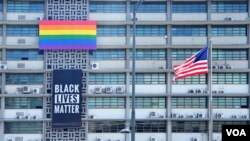The U.S. Embassy in Seoul has removed a “Black Lives Matter” banner and rainbow flag in support of LGBTQ rights, after President Donald Trump and senior State Department leaders complained about the displays, according to a U.S. news outlet.
Bloomberg News reported Monday that Trump and Secretary of State Mike Pompeo were displeased with the banners, which had hung for several days on the front of the main U.S. embassy building in Seoul, South Korea.
In a statement late Monday, an embassy spokesperson said Ambassador Harry Harris had decided to display the Black Lives Matter banner “to communicate a message of solidarity with Americans concerned with racism, especially racial violence against African Americans.”
“He wanted to highlight the enduring American values of racial equality, freedom of speech, and the right to peacefully protest. However, the Ambassador’s intent was not to support or encourage donations to any specific organization. To avoid the misperception that American taxpayer dollars were spent to benefit such organizations, he directed that the banner be removed,” the statement read.
“This in no way lessens the principles and ideals expressed by raising the banner, and the Embassy will look for other ways to convey fundamental American values in these times of difficulty at home,” it added.
The display was the latest example of U.S. government, military and other institutions expressing self-reflection and solidarity with the wave of global protests following recent U.S. police killings of African Americans.
Although many of the U.S. protesters have been critical of Trump, the movement is largely focused on police violence, as well as the practices and allegations of racial bias in U.S. institutions.
On Monday, the U.S. military in South Korea, which had already held a series of Black Lives Matter community events, went a step further, banning displays of the Confederate battle flag on its bases.
“The Confederate battle flag does not represent the values of U.S. forces assigned to serve in the Republic of Korea,” read a memo by General Robert Abrams, the commander of U.S. Forces Korea.
“While I acknowledge some might view it as a symbol of regional pride, many others in our force see it as a painful reminder of hate, bigotry, treason, and devaluation of humanity,” Abrams added.
1/7
— Robert Abrams (@DogFaceSoldier) June 5, 2020
We should all be outraged and ashamed at the killing of George Floyd & others by police. I know I am.
We should be equally outraged against racism and bigotry that continues. To be clear—there is NO place for it in our country and NO place for it in our military. ZERO.
The U.S. Navy and Marine Corps have already moved to prohibit displays of the Confederate flag, which was carried during the U.S. Civil War by southern forces that wanted to preserve slavery.
The U.S. Army has also said it was open to renaming nearly a dozen bases named after leaders of the Confederacy, which surrendered to Union forces in 1865. But the move to rename bases was criticized by Trump, who has long opposed the removal or destruction of Confederate displays.
“These Monumental and very Powerful Bases have become part of a Great American Heritage, and a history of Winning, Victory, and Freedom,” Trump tweeted last week. “Therefore, my Administration will not even consider the renaming of these Magnificent and Fabled Military Installations.”
Neither Trump nor Pompeo have publicly commented on the displays at the U.S. Embassy in Seoul.
Major shift
Polls have revealed widespread support for the protests, underscoring a major shift in U.S. public opinion since the previous rounds of Black Lives Matter demonstrations.
"Something seems different this time,” says Daniel Pinkston, who teaches international relations in Seoul.
Major U.S. institutions such as the military and diplomatic corps, which have diverse, multicultural workforces, now face significant pressure to confront racism, says Pinkston, a former Air Force linguist.
Not dealing with those problems, especially in the military, “undermines productivity, effectiveness and morale,” he adds.
For U.S. diplomats, who often criticize the rights abuses of foreign autocrats, part of the concern may also be about consistency in messaging - especially as international headlines condemn the heavy-handed U.S. police response to the protests.
“I've never seen the U.S. reputation take this kind of hit in such a short time,” says Pinkston.
Making a statement
So far, the embassy in Seoul appears to have been the only U.S. diplomatic outpost to have prominently displayed a Black Lives Matter sign.
"I was glad to see Ambassador Harris take a stand that black lives matter,” said Abraham Denmark, a former senior Pentagon official now with the Woodrow Wilson International Center for Scholars. “But ultimately he has to follow direction from his leadership.”
Harris, a Trump appointee and former Navy admiral, is planning to resign at the end of the year, according to a recent Reuters report which the U.S. embassy has not confirmed.
It’s not the first time the embassy in Seoul has taken a stance on social issues.
The embassy has for years flown a rainbow flag in solidarity with human rights and civil society organizations that push for LGBTQ rights in South Korea. Many U.S. embassies around the world fly such flags, especially during June, which is LGBTQ Pride Month.
But the Trump administration last year demanded embassies submit a formal request to fly the flag on their flagpoles, according to NBC News. Many of those requests were denied, it said; instead, the embassies were told they could only fly the flags in other places, such as the side of their building or indoors.
